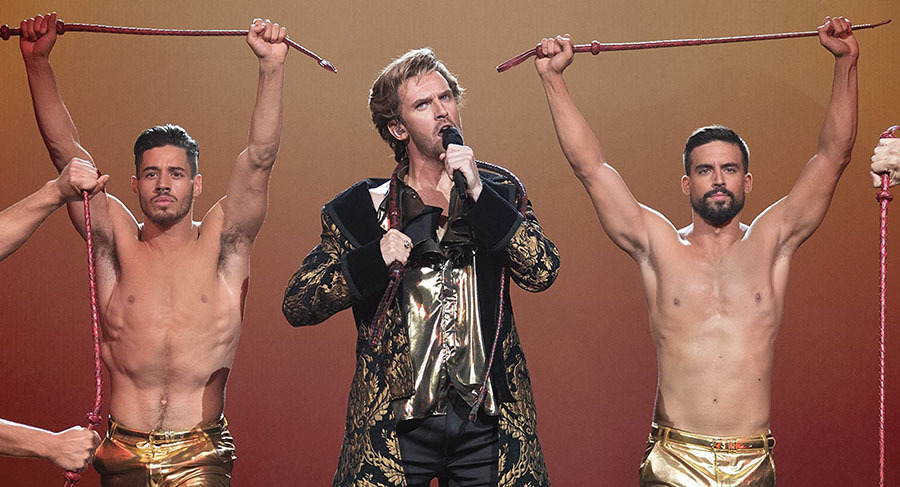On June 26, on the Netflix platform, the premiere of the film Eurovision: The History of the Fire Saga took place. The project was directed by David Dobkin ("Fred Klaus, Santa's brother"). The main roles in the film were played by Rachel McAdams and Will Ferrell. He also co-wrote the script.
According to the plot, Lars Ericsson (Ferrell) since childhood - from the very moment when he saw the performance of the ABBA group on television - has been dreaming of winning the Eurovision Song Contest. All his life he tried to realize this desire, because of which he did not get a family or decent work. That his childhood friend Sigrit (Rachel McAdams) believes that Ericsson will take first place in the song contest. They perform for a couple in a local eatery (where the audience prefers vulgar ditties to their songs), and also, without a twinge of conscience, spend electricity on rehearsals in the parent's garage.
Once the leadership of public television still invites the “Fire Saga” (the so-called duet) to national selection - only in order to gain the number of participants established by the rules. However, by chance, all other applicants are tragically killed, and the Fiery Saga goes to a competition in Edinburgh. At the same time, the parents, compatriots and compatriots of the heroes are sure that they will fail.
The story is built around the theme of dreams, but the film was conceived as a parody. From the first shots, viewers see a solid Icelandic "cranberry".
Filmmakers show the inhabitants of the town fools and simpletons. Sigritus firmly believes in the existence of elves and tries to appease them with refreshments. Her mother walks in a national costume and is engaged in weaving.
The main characters give the impression of freaks (by the way, fully consistent with the concept of Eurovision). They behave like teenagers - they are naughty, do not want to work, they are ready to fall into hysteria for any reason. If the heroine of Macadams just looks naive, then the character of Ferrell is one big caricature. He conceives, perhaps, only Nette and Konchite Wurst, who appear in the film in the roles of a cameo.
- © kinopoisk.ru / Netflix
Filmmakers focus on the couple’s failed attempts to adapt to the “civilized” European world: the heroes try to rob a minibar, and then get drunk to vomit. “Let the fun go out,” Lars instructs a fighting friend leaning over the toilet.
But the competition itself became the main target for jokes.
In dreams, Sigrit and Lars see themselves as the heroes of a typical cliched Eurovision video clip. Musicians appear in naive-fantasy costumes against a background of colorful nature - like many real participants of the competition before them. The film's director David Dobkin (he previously shot clips for Tupac Shakur and Maroon 5) successfully coped with the task of making fun of this cliche.
For victory in the national selection, the “21st Century Viking” competed - an outwardly brutal, but emphasized sweet-voiced character. The main characters, in turn, comically tried to soar above the stage on wings fitted to special cables - it's time to remember what tricks the contestants actually go to surprise the audience.
In the Eurovision semifinal, Lars had to run around the stage in the likeness of a hamster wheel. Sigrit's scarf became entangled in it - the heroine almost suffocated when the unit flew into the auditorium, threatening to crush the crowd.
There is a vivid contestant from Russia in The History of the Fire Saga. Alexander Lemtov performed by Dan Stevens (Downton Abbey, Beauty and the Beast) reminds Nikolai Baskov with his patterned outfits and opera voice, and his physique resembles sports Alexei Vorobyov, who really represented Russia at the 2011 Eurovision Song Contest.
- © imdb.com / Netflix
Lemtov is distinguished by fabulous wealth, a love of gold in clothes and interiors (Kirkorov?), As well as an irresistible craving for narcissism. His competitive composition (for some reason with Spanish notes) is called “Lion of Love”.
However, Lemtov, despite the comic, does not seem stereotypical. This is not a negative character, and reasonable thoughts even sound from his lips - for example, that you need to value your talent and not be afraid to declare it. Lemtov calls himself a "gentleman" and with varying success supports the declared image.
In general, the humor in the picture rests on three pillars: stereotypes, a discussion of physiological details and the theme of death. Filmmakers managed to make fun of the competition, but still you should not expect sparkling jokes from the heroes.
Quite unexpectedly, the musical content became the strength of the tape - the quality of even parody compositions deserves approval. Spectators will hear many hits from different years: from Waterloo ABBA and Believe Cher to the winning competitive song of the Portuguese Salvador Collected Amar pelos dois (which, incidentally, is performed by the singer himself).

